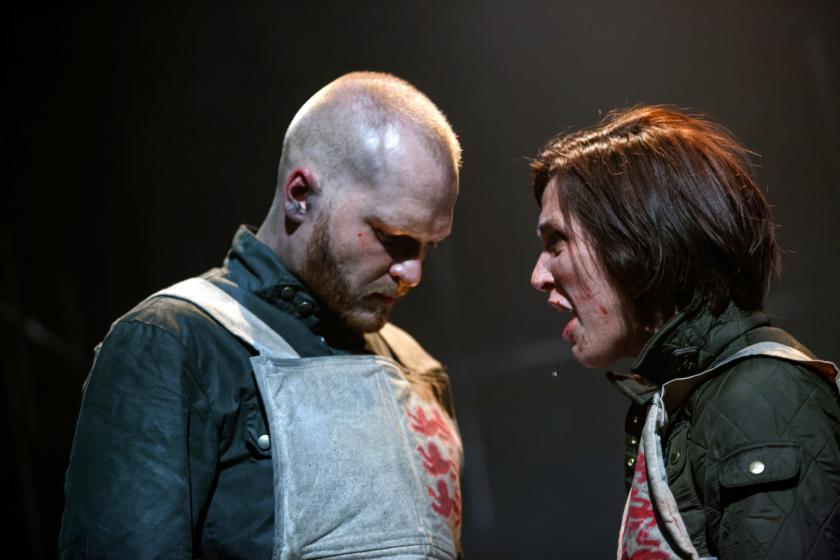Henry V is a play shot through with martial energy and the terrible chaos of war. The almost overpowering violence and energy that characterise the story give the unfolding of the drama a permanently disrupted form, as if the unpredictability of history and the reality of bloodthirsty men going berserk on the field of battle had undermined Shakespeare’s usual formal strengths.
Elizabeth Freestone’s very lively and intelligent modern-dress production for Shakespeare at Tobacco Factory, which has moved to the company’s home stage in Bristol, struggles at times with the play’s disjointed nature and clumsy structure. She has done well with a flawed text, though at times, such as the convoluted last section of the play, the production flags, just when it should be at its most potent.
 Perhaps because Shakespeare realised that the play’s seams were all-too-obvious, he provided a returning Chorus, who sets the scene and provides narrative continuity. Joanne Howarth has an electrifying presence that helps make the most of this crucial element in the play. Her call to the audience’s imagination before the action starts, a typically Shakespearean way of drawing us in, while simultaneously making us aware of the artifice we are about to enjoy, is done with just the right dose of magic. Her moments on stage are given an otherworldly quality – appropriately as she stands outside the story itself – by elegant sound design from Giles Thomas, whose music and effects contribute a lot to the violent atmosphere required.
Perhaps because Shakespeare realised that the play’s seams were all-too-obvious, he provided a returning Chorus, who sets the scene and provides narrative continuity. Joanne Howarth has an electrifying presence that helps make the most of this crucial element in the play. Her call to the audience’s imagination before the action starts, a typically Shakespearean way of drawing us in, while simultaneously making us aware of the artifice we are about to enjoy, is done with just the right dose of magic. Her moments on stage are given an otherworldly quality – appropriately as she stands outside the story itself – by elegant sound design from Giles Thomas, whose music and effects contribute a lot to the violent atmosphere required.
The production – with its allusions to the tangled battlefields of the First World War – focuses on what Wilfred Owen aptly called the pity of war: the way in which power struggles, territorial ambition and a natural human propensity for violence and aggression can lead to pointless death. Ben Hall, as the young king, evokes very poignantly the torment of a sensitive man who is called to war, repeatedly rouses his troops and yet feels the full horror of the terrible deeds he has unleashed. He navigates with deftness an inner tempest in which feelings are conflicted and change in an instant.
The rest of the cast are good – with several very capably undertaking changes of roles that demonstrate their confident acting skills: not least David Osmond as the smooth-tongued traitor Cambridge, who returns as the verbally nimble Welsh soldier Fluellen, and a powerful and charismatic Zachary Powell who starts as Nym, and after his death returns as Orleans. Amy Rockson vividly evokes the masquerade of power politics and diplomacy as the French ambassador Montjoy: her discomfiture after the rout at Agincourt is all the more believable, as her façade crumbles and the humiliation of defeat pierces through.
As well as being about the horrors of warfare, this is a play that uncovers the humanity beneath the posturing and projection that is the basis for hierarchy and the exercise of power. Henry is revealed as being as vulnerable as any of his foot-soldiers, and yet, without the almost shamanic institution of kingship, men might not be led to war.
The comic interludes that regularly interrupt the play’s main action fail to provide the belly-laughs and verbal delight that make the device work so well in most of Shakespeare’s work. War is perhaps too dark to allow for such diversions. And yet, Chris Donnelly as Pistol, the born survivor, acquits himself well, until the play’s very end, as the personification of humanity’s worst instincts and yet a lovable rascal too: his flaws almost endearing, and no worse than the duplicity and hypocrisy of the so-called better he mocks and derides.
The star of the production may be Heledd Gwynn (pictured above left) as the Dauphin Katharine, shaven-headed, pierced, tattooed and sporting heavy-duty boots: she is convincingly fierce, petulant and self-centred, and chillingly furious at her final and forced betrothal to the victorious English King. Her reluctant acceptance of the necessities of realpolitik feels more tragic than the happy end and reconciliation that marriage usually signifies at the close of a Shakespeare play.
Henry V At Tobacco Factory Theatres until 6 October, then touring:
Stephen Joseph Theatre, Scarborough 9-13 October
The Dukes, Lancaster, 16-20 October
Malvern Theatres 23-27 October
Theatre Royal, Bury St Edmonds, 30 October-3 November
Exeter, Northcott Theatre, 6-10 November














